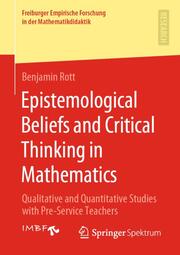-
Zusatztext
-
Epistemological beliefs-i.e. beliefs on the nature of knowledge, its limits, sources, and justification-play an important role both in everyday life and in learning processes. This book comprises several studies dealing with such beliefs in the domain of mathematics; amongst others a qualitative interview study, and quantitative studies for which a new questionnaire has been developed. In this new instrument, belief position (e.g. "mathematical knowledge is certain" vs. "uncertain") and belief argumentation (the way those positions are justified) are differentiated. Additionally, a test for mathematical critical thinking has been designed.The results show significant correlations between sophisticated belief argumentations and high scores in the critical thinking test, but no correlations regarding belief positions.
-
-
Kurztext
-
Epistemological beliefs-i.e. beliefs on the nature of knowledge, its limits, sources, and justification-play an important role both in everyday life and in learning processes. This book comprises several studies dealing with such beliefs in the domain of mathematics; amongst others a qualitative interview study, and quantitative studies for which a new questionnaire has been developed. In this new instrument, belief position (e.g. "mathematical knowledge is certain" vs. "uncertain") and belief argumentation (the way those positions are justified) are differentiated. Additionally, a test for mathematical critical thinking has been designed.The results show significant correlations between sophisticated belief argumentations and high scores in the critical thinking test, but no correlations regarding belief positions. Der AutorDr. Benjamin Rott is Professor of Mathematics Education at the University of Cologne. His research focuses on mathematical problem solving, beliefs, and giftedness. The present work was written as a postdoctoral thesis (Habilitation) at the University of Education Freiburg.
-
-
Autorenportrait
- Dr. Benjamin Rott is Professor of Mathematics Education at the University of Cologne. His research focuses on mathematical problem solving, beliefs, and giftedness. The present work was written as a postdoctoral thesis (Habilitation) at the University of Education Freiburg.
Detailansicht
Epistemological Beliefs and Critical Thinking in Mathematics
Qualitative and Quantitative Studies with Pre-Service Teachers, Freiburger Empirische Forschung in der Mathematikdidaktik
ISBN/EAN: 9783658335380
Umbreit-Nr.: 940743
Sprache:
Englisch
Umfang: xvi, 162 S., 21 s/w Illustr., 162 p. 21 illus.
Format in cm:
Einband:
kartoniertes Buch
Erschienen am 31.08.2021
Auflage: 1/2021


